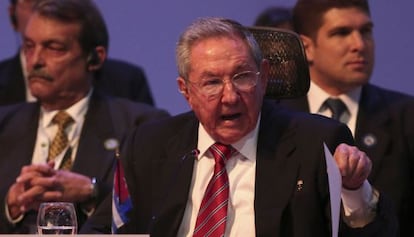Raúl Castro urges Obama to make up for the “human cost” of the embargo
Cuban leader shares his conditions for normalizing relations with the US

During his speech at the Third Summit of the Community of Latin American and Caribbean States (CELAC), Cuban President Raúl Castro criticized the United States for the trade and financial embargo it has imposed on the island despite the fact that he and US President Barack Obama both announced plans to open bilateral dialogue on December 17, 2014.
Before a crowd that included most heads of states from CELAC’s 33 member nations, Castro said the normalization of bilateral relations would “not be possible while this embargo exists, or as long as they do not return the territory illegally occupied by the naval base in Guantánamo, or stop radio and TV transmissions that violate international regulations, and as long as there is no just reparation to our people for the human and economic costs they have suffered.”
The Cuban leader recognized Obama’s efforts to move toward relaunching diplomatic relations after more than half a century of hostilities but said that “the main problem has not been solved.” “The economic, trade and financial embargo, which causes enormous human and economic costs and violates international law, should stop,” he said before thanking the other leaders present for their support in denouncing the embargo.
The embargo violates international law”
Raúl Castro
Castro was the first president to arrive at the summit around midday on Tuesday and on Wednesday he was the first to speak about Cuban relations with the United States. “It would not be ethical, just, or acceptable if anything was asked of Cuba in exchange. If these problems do not get solved, rapprochement between Cuba and the United States would not make sense.”
The summit’s objective is to fight extreme poverty, which affects 12 percent of the region’s 600 million population. Costa Rican Foreign Minister Manuel González said that, by the end of the conference, members might be able to agree to set the goal of reducing extreme poverty in the region by half. Costa Rica, the summit’s host and the current CELAC president, is now set to hand the post over to Ecuador.
Costa Rican President Luis Guillermo Solís welcomed members to the city of Belén in four languages to show the diversity of the group – and the differences that turn to obstacles when it comes to making concrete, practical decisions based on consensus.
Meanwhile, the region is grappling with the economic slowdown. According to the Economic Commission for Latin America (ECLA), some countries grew by only 1.1 percent, the lowest growth rate since 2009. The downturn is also a byproduct of economic realities in Brazil, Argentina, Mexico and Venezuela. On average, the region grew by 2.8 percent in 2014, about as much as it did in 2013, and job creation has lost momentum over the last five years.
The proposal to end the embargo has found some opponents in Washington
The main topic on the agenda, however, has drawn less attention than the Cuban issue. This is the first event Raúl Castro has attended since December 17, 2014 and CELAC is expected to support this new era in Cuban-American diplomacy and the call to bring an end to the embargo, as Obama urged Congress to do in his State of the Union address last week. But the proposal has found some opponents in Washington. Castro has pointed out that Obama “could use his executive powers with determination and modify the application of the embargo substantially without congressional action.”
The Cuban leader also called on his country and the United States to “learn the art of civilized coexistence.” Yet, in the next paragraph, he insisted that Cuba would not yield its position on any internal matters. “We will not let them provoke us and we will not accept any attempt to counsel or pressure us on internal affairs. We have won the right to sovereignty with great sacrifices and by taking the greatest risks.”
According to inside sources at the summit, CELAC leaders will issue a joint statement against the embargo on Thursday.
The conference is being held at a private location in Belén, Costa Rica, 15 kilometers from the capital, San José.
Translation: Dyane Jean François
Tu suscripción se está usando en otro dispositivo
¿Quieres añadir otro usuario a tu suscripción?
Si continúas leyendo en este dispositivo, no se podrá leer en el otro.
FlechaTu suscripción se está usando en otro dispositivo y solo puedes acceder a EL PAÍS desde un dispositivo a la vez.
Si quieres compartir tu cuenta, cambia tu suscripción a la modalidad Premium, así podrás añadir otro usuario. Cada uno accederá con su propia cuenta de email, lo que os permitirá personalizar vuestra experiencia en EL PAÍS.
En el caso de no saber quién está usando tu cuenta, te recomendamos cambiar tu contraseña aquí.
Si decides continuar compartiendo tu cuenta, este mensaje se mostrará en tu dispositivo y en el de la otra persona que está usando tu cuenta de forma indefinida, afectando a tu experiencia de lectura. Puedes consultar aquí los términos y condiciones de la suscripción digital.








































